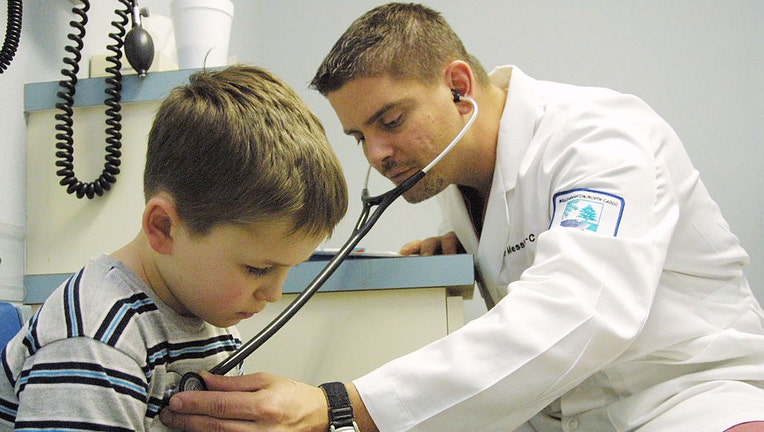CDC issues alert about 'walking pneumonia' in kids

FILE-A child gets a checkup in a doctor's office. (Photo by Mario Villafuerte/Getty Images)
The Centers for Disease Control and Prevention issued an alert related to a form of walking pneumonia on the rise among kids in the U.S.
Mycoplasma pneumoniae is a common cause of mild respiratory illness and since late spring, the number of infections caused by the illness has been increasing, particularly among young children. CDC officials sent out an Oct. 18 bulletin to the public about the increase in illnesses.
These infections can occur at any age, but they most often occur among children ages 5–17 years old and young adults. Younger children may have different symptoms like diarrhea, wheezing, or vomiting.
CDC officials noted that individuals with pneumonia caused by Mycoplasma pneumoniae can seem better than expected for someone with a lung infection. With mild symptoms, people may not stay home or in bed, which has led to the phrase "walking pneumonia."
Separately, the CDC, which evaluates discharge data from hospital test results from commercial laboratories, noted that the number of children ages 2 through 4 who were seen in the emergency froom for pneumonia and who tested positive for Mycoplasma soared from 1% in April 2024 to 7.2% in early October. Diagnoses in older kids doubled during that same period, jumping from 3.6% to 7.4%.
Additionally, the agency also reported that people testing positive for mycoplasma pneumoniae has surged since late spring for all age groups, from 0.7% to 3.3%.
What are the symptoms of walking pneumonia?
Mycoplasma pneumoniae infections or "walking pneumonia" are generally mild and mostly present as a chest cold but may also present as pneumonia. Symptoms can include fever, cough, and a sore throat.
According to the CDC, Mycoplasma pneumoniae bacteria are spread by inhaling respiratory droplets produced when an infected person coughs or sneezes.
Other indviduals can get infected if they breathe in those droplets. Strategies that prevent respiratory viruses, like handwashing and covering coughs and sneezes, also prevent these bacteria from spreading.
Outbreaks occur mostly in crowded environments such as schools, college residence halls, and nursing homes.
Moreover, CDC officials say most people with a mild Mycoplasma pneumoniae infection will recover on their own without medicine. Over-the-counter medicines can help you feel better while you're recovering.
According to the CDC, Mycoplasma pneumoniae infections are common, with an estimated 2 million infections happening annually in the U.S.

